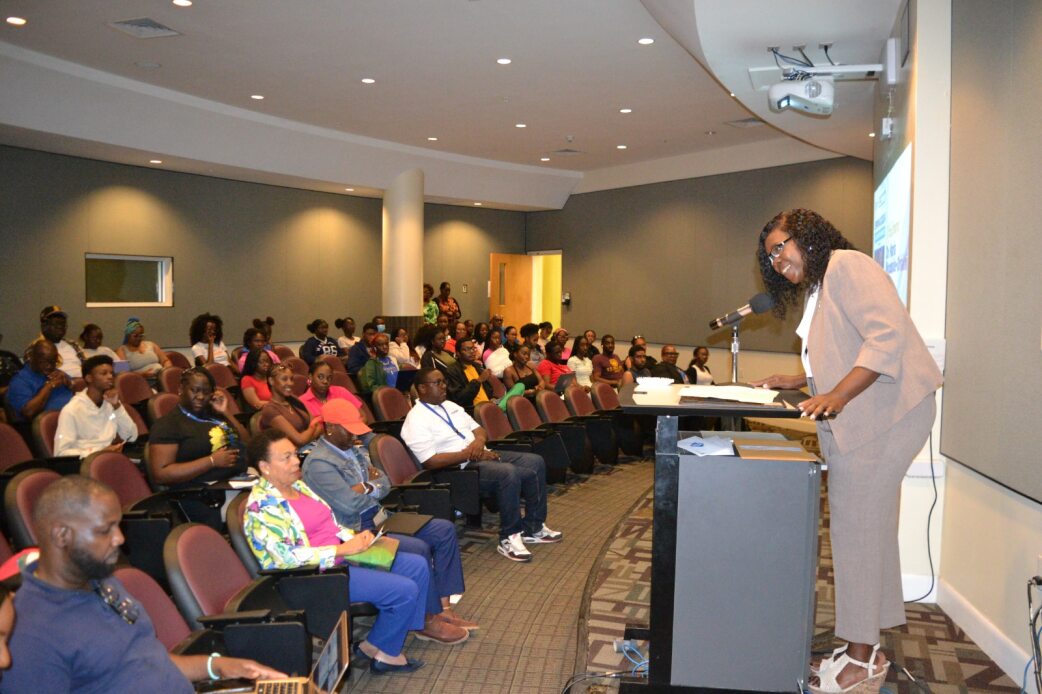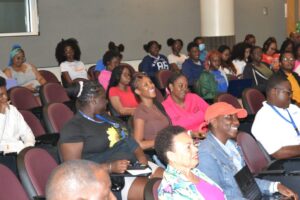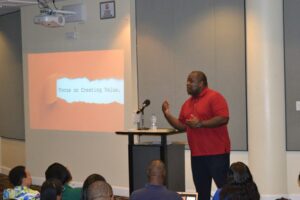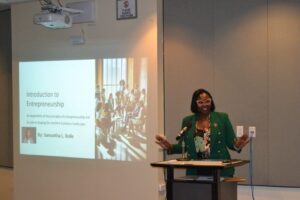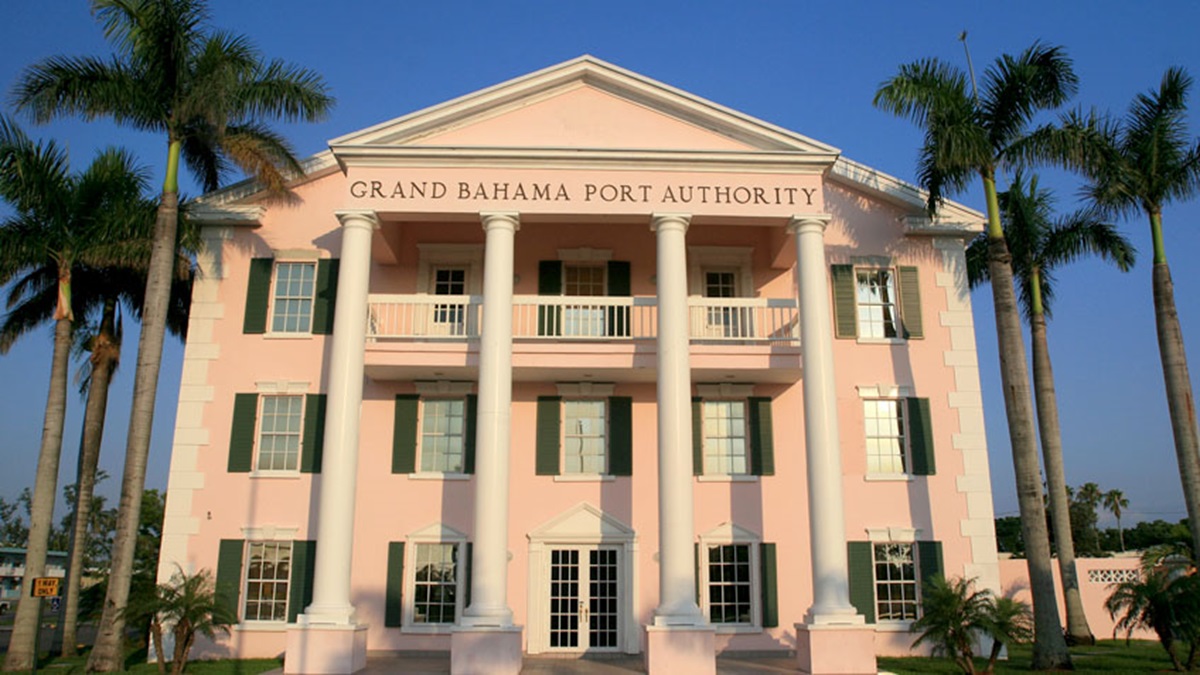#Bahamas, February 23, 2018 – Nassau – Deputy Prime Minister and Minister of Finance, the Hon. Peter Turnquest said based on the performance in the first half of fiscal year 2017/18, the country is moving in the right direction.
“Compared with the first six months of Fiscal Year 2016/17, the fiscal performance has turned in a $92.3 million or 61.4 per cent reduction in the overall deficit—to $198.0 million, from $290.3 million in Fiscal Year 2016/17,” the DPM said in a ‘State of the Economy Report,’ hosted by the Bahamas Chamber of Commerce and Employers Confederation at Atlantis, Paradise Island, February 21, 2018.
He said gains in revenues of $24.8 million are supported by a $67.5 million or 43.6 per cent reduction in spending; comparisons with the budget show revenues running at some 41 per cent of the target and adjusted recurrent and capital spending, at 44.7 per cent and 33 per cent, of their respective targets.
“We believe that the measures taken, and those in the pipeline, have the ability to help restore fiscal discipline and place the finances on a sustainable path for the benefit of all Bahamians. However, we would acknowledge that these measures alone will not get us to where we want and need to be.
“Most importantly, we must grow our economy and do so in a sustained way; additionally, if our fiscal plans are to be sustainable, they need to be reinforced by other administrative and legislative initiatives designed to bolster credibility, in a transparent and accountable manner.”

The DPM explained that last year, he introduced to the public, the public financial management reform measures underway to deliver more efficient and effective allocation and use of public funds, by addressing cumbersome processes and inconsistent and outdated practices in our public financial management activities.
“An important element of the Public Financial Management reform agenda focuses on bringing greater transparency, fairness and efficiency to bear on public procurement activities.”
He said public procurement is big business for governments, and equally as big are the temptations and opportunities for corruption, collusion, fraud and manipulation.
“For The Bahamas, more than $1.475 billion or an estimated 13 per cent of Gross Domestic Product was spent in FY2016/17 to acquire goods and services —underscoring the imperative for the Government to obtain value for monies spent.”
The DPM said the first stage in these reform efforts was marked by the recently launched pilot phase of the Government eProcurement portal—a single access point—where all announcements, documents and information about tender participants, summary of bid evaluation reports, and notice of procurement awards will be published.
“All suppliers interested in doing business with the Government have been invited to register their businesses by uploading all of the requisite documents via the portal.”
He said work is also well advanced on finalizing the draft public procurement legislation that will bring the regulatory framework closer in line with international standards and best practices. Some of the areas covered in the legislation are the establishment of a public procurement department; a public procurement board, and a public review tribunal to provide persons with an avenue for recourse.

“The most critical element of this procurement reform will be the requirement that all tenders and bid offers be published publicly online and that all successful bid offers accepted by government also be awarded. This, ladies and gentlemen, changes the game for all stakeholders.”
The DPM explained that these same principles of transparency and competition are behind the Government’s recent decision to engage the services of the Caribbean Development Bank to formulate a Public, Private Partnership. Having clear and transparent policy guidance for all stakeholders will ensure that the Government is identifying the right private sector partner and carrying out the required analysis of all risks, while easing the burden on public resources.
DPM Turnquest said, “These reforms are long overdue, but once completed will increase the ease of doing business with the Government, make procurement processes more transparent and competitive, and are generally supportive of the Government’s overall goal of restoring the public’s trust in its management of public funds.
By: Llonella Gilbert (BIS)
Photo Caption: Deputy Prime Minister and Minister of Finance, the Hon. Peter Turnquest brings remarks at the ‘State of the Economy Report’ hosted by the Bahamas Chamber of Commerce and Employers Confederation (BCCEC) at Atlantis, February 21, 2018. Looking on from left are CEO, BCCEC, Edison Sumner and Chairman, BCCEC, Mike Maura, Jr.
(BIS Photo/Patrick Hanna)
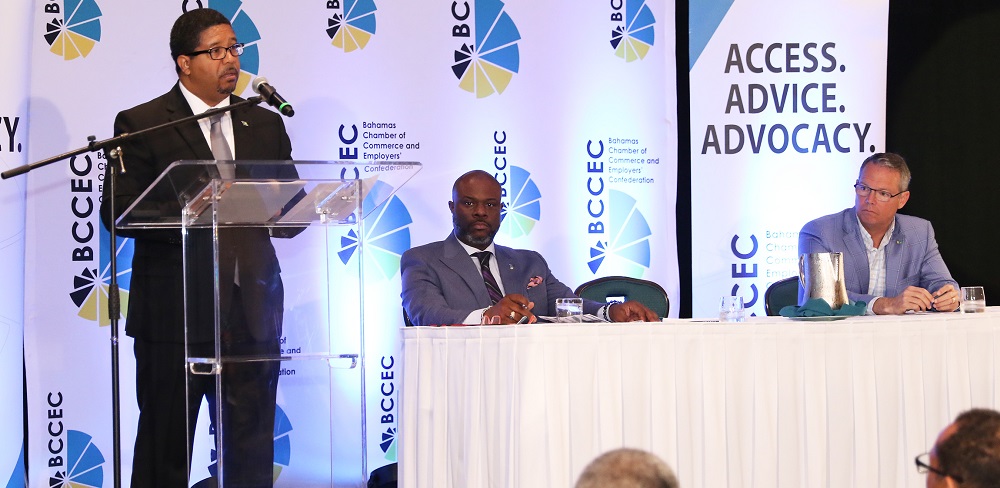

 News1 day ago
News1 day ago
 Health1 week ago
Health1 week ago
 Caribbean News3 days ago
Caribbean News3 days ago
 Caribbean News6 days ago
Caribbean News6 days ago
 Health1 week ago
Health1 week ago
 Caribbean News6 days ago
Caribbean News6 days ago
 Bahamas News5 days ago
Bahamas News5 days ago
 Health2 days ago
Health2 days ago


